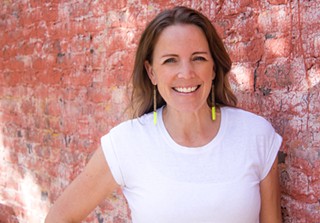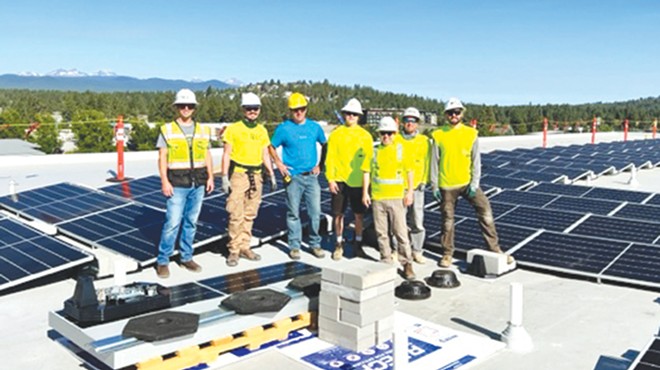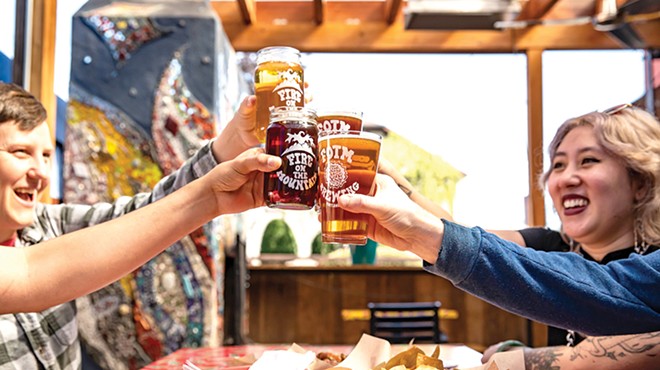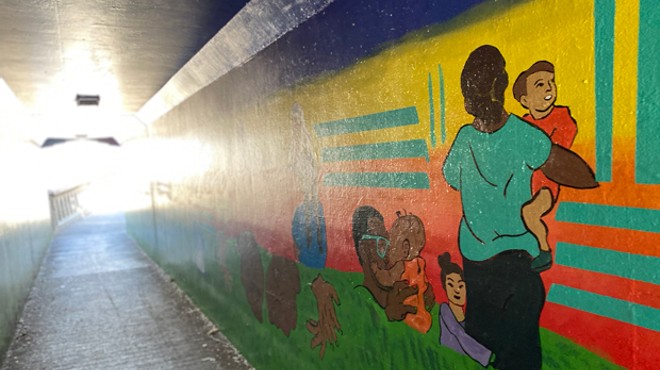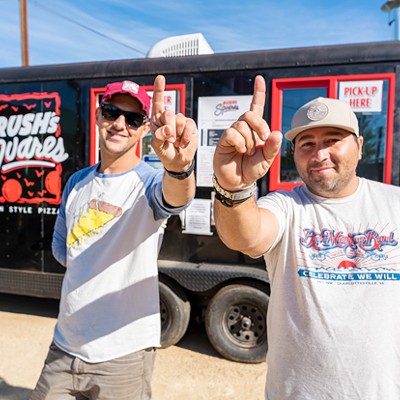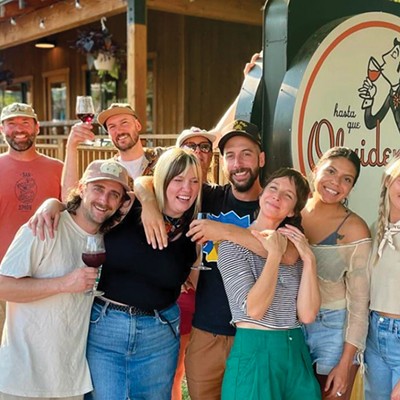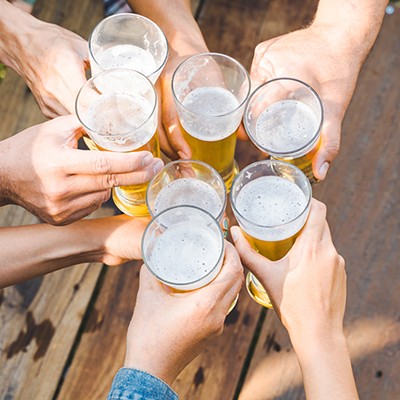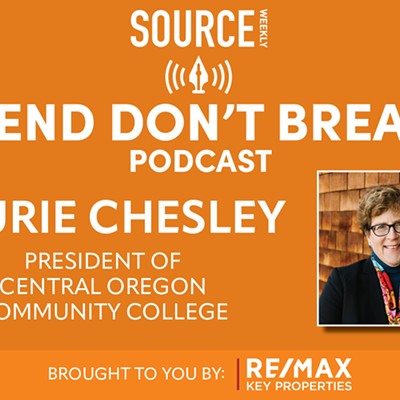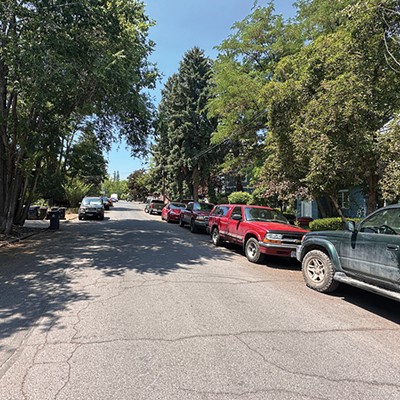Some call it The Moat. Others, The Tracks. Others have less-flattering names for the act of moving from west Bend to east, doing so via only the handful of arterials that cross the city, over or under its railroad bridges, and under the Bend Parkway. Whatever you call it, the reasons to cross that moat keep stacking up, as midtown Bend—roughly defined as the area hugging Highway 97 on either side, and also known as the Bend Central District, picks up steam.
![Midtown Rising ▶ [With Video]](https://media2.bendsource.com/bend/imager/u/blog/14173154/feature1.4.jpg?cb=1680199350)
In other words, there are more and more reasons to visit midtown these days. That is, of course, unless you're one of the lucky ones who already lives nearby. For you, reaping the rewards of a growing food and cultural scene is only getting better.
A revitalization effort
The idea to revitalize areas closest to downtown Bend is a long time coming. The City of Bend includes the area just east and west of the railroad tracks near downtown in its Core Area Project, a series of projects that could include, "streetscape improvements, public spaces, gateways, affordable housing, or art and beautification programs," according to the City's web page for the project. In total, the City's Core Area is defined as the Bend Central District, East Downtown, Inner Highway 20 / Greenwood, and KorPine—the area roughly between Arizona Avenue and the Old Mill. In 2020, the City Council approved a Tax Increment Financing Plan for the Core Area Project, allowing the City to set aside the tax dollars that accrue from increases in assessed property value, and to put those dollars into a fund for improvements for these areas.
To meet demands from the state for more infill, the BCD was rezoned during the Urban Growth Boundary process in 2016, to allow for increased building heights and reduced parking requirements. The Bend City Council also set up the Bend Urban Renewal Advisory Board, a 13-member volunteer committee tasked with creating a common vision and plan.
For Central Oregon LandWatch, which advocates for sustainable growth both in urban and rural spaces, the Bend Central District/Core Area Project represents not just an opportunity to improve the area, but to ensure those improvements foster equity and inclusion and help solve the city's housing crisis—which has only gotten more acute as Bend has become a "Zoom town" with a high percentage of remote workers. Even before the pandemic and its resulting urban flight, in 2019, Bend was leading the U.S. in the percentage of remote workers, with over 12% of people in the city working remote, according to U.S. Census data. An area so close to downtown, with existing sewer lines, electricity and other infrastructure, is ripe for helping fill the gaps in housing and other services.
"Right across from downtown, there's only about 100 people who live in that 200 acres, so there is a ton of potential for more housing where people can live near their jobs, near the grocery store, walk out their front door and go next door to their favorite coffee shop," Moey Newbold, director of urban planning for COLW told the Source. "But the conditions just haven't been in place to have that kind of development—so the Bend Central District plan is a way to move that vision forward."
Avoiding the G word: Gentrification
And while there's opportunity, Newbold and COLW also hope to avoid common pitfalls that come with redevelopment—namely, the gentrification that can lead to displacement."We've seen this play out in cities across the United States, is that when change like this happens, things will improve for the people who already live here—streets will get safer for biking and walking and people have more access to amenities, but the challenge can be that people get displaced who might live nearby, or the rents go up or businesses who rent might have their building redeveloped," Newbold said. "So, what we're really hoping is that together we can all re-envision a new type of community redevelopment that's actually building on the community's wealth."
“The Orchard district neighborhood really embraces diversity and wants to be a welcoming neighborhood, so what’s really important is that we honor and listen to people from Latinx origins, BIPOC communities, and try to figure out ways that they can lead the effort.” —Moey Newbold
tweet this
To support that vision, Newbold and COLW created a Bend Central District Visionary Board, made up of community stakeholders consisting of residents—including renters, social service agencies and houseless people who live in the area, working in tandem with developers. Newbold has high hopes that not only will new businesses come in and attract more interest in the area, but that existing ones will thrive, too.
"I'm not sure if a lot of people realize that this part of town is actually the most diverse— which is super exciting," Newbold said. "The Orchard district neighborhood really embraces diversity and wants to be a welcoming neighborhood, so what's really important is that we honor and listen to people from Latinx origins, BIPOC communities, and try to figure out ways that they can lead the effort," she said.
"I would like to see a place like Colima Market, that's really a mainstay for the Latinx community, be able to work towards owning their building—and that's something that the Tax Increment Financing District that was just passed by City Council could help with," she said. "But it needs the input of the community to say, 'you know, we want these dollars to go toward supporting women minority-owned businesses and affordable housing. We want all of that investment to be directed by the community and have really deep engagement and participation.'"
Thus far, much of the redevelopment and revitalization has come in the way of commercial activity, though Newbold has hopes for more housing in the future, too. In addition, projects including the City's Neighborhood Greenways and Low Stress Network for bikes are aimed at making getting around the area easier for those not in cars.
Neighborhood Greenways
For years, people in the Orchard neighborhood—just east of the Bend Central District—have been pushing to make the area more pedestrian and bike friendly. Many streets, even a block or two from commercial zones, don't have sidewalks, and crossing the railroad tracks and Third Street to go into downtown via existing streets can be intimidating for some. The City of Bend's Neighborhood Greenways project has been part of the solution. Orchard's NE Sixth Street was one of the first streets in the city to be named a Greenway, where speed humps, signage and crosswalks encourage walking or biking rather than vehicle traffic. Still, neighbors see gaps. A promised safe crossing over Greenwood Avenue at Sixth Street, which would improve access to Juniper Swim and Fitness Center, is still not completed. That crossing is managed by the Oregon Department of Transportation, not the City of Bend. In Phase 4, more Greenways are planned surrounding Juniper Park and on Franklin and Hawthorne avenues, from the Orchard District into downtown."The budget for Phase 4 becomes available July 1st so we anticipate starting design and public outreach the second half of this year and continuing into the first half of 2022," Rory Rowan, project engineer for the City of Bend, told the Source. "Construction is anticipated in 2022."
Voters in Bend also approved Measure-135, Bend's Transportation Bond, in November, which brings $190 million in bond funding to the city for major traffic improvements, as well as improvements to biking and walking infrastructure.
Midtown Yacht Club
Food cart lots are all the rage in Bend these days, and it was only a matter of time before midtown Bend got its own version. Carved from an empty lot on NE Fourth Street and Quimby—and within spitting distance of The Last Blockbuster, the Midtown Yacht Club food cart pod is home to a handful of carts, including the new Shimshon food truck, the brainchild of Steven Draheim, owner of Barrio, which also has a cart at Midtown.The Israeli street food cart started when Draheim began "pulling recipes from Michael Solomonov's cookbook, 'Zahav,'" Draheim wrote in a note to followers on the Barrio website in December. He also grabbed even more recipes from his wife's grandmother, he wrote.
Midtown Yacht Club offers a hearty dose of fire pits and a giant tent for these COVID times—and an easily bikeable place for a beverage or meetup for residents of the east side (or anyone willing to cross The Moat).
"This is a great example of a new mixed-use development that's already been embraced by the neighborhood," said Newbold of COLW. "There's actually offices above the tap room, so this is the kind of thing that makes good use of the space, and also creates a community gathering space and offers something that the neighborhood really didn't have before."
Ironically, the additional street parking added near the space did away with the existing bike lanes along that portion of Fourth Street—something that upset advocates of multi-modal transportation. Now, "sharrows," rather than the dedicated bike lane found elsewhere on the street, encourage drivers to share the road with cyclists.
Sunlight Solar
"Another thing that is really exciting is the new Sunlight Solar headquarters on Hawthorne, across from Oregon Spirit Distillers," Newbold of COLW said. "They also built in commercial space—so that's another mixed-use building that's going to be all net-zero energy efficient and powered by its own solar power."Owner Paul Israel told the Source in February 2020 that he was excited to be a pioneer in the BCD, believing the area will one day transform into a thriving neighborhood bringing together the east and west sides of Bend.
Lucy's Taco Shop
Long a staple of downtown Redmond and a frequent winner in the Source's Best of Central Oregon readers' poll, Bendites got their own version of Lucy's Taco Shop this summer, when a drive-thru Lucy's opened on Third Street, in the former Baja Fresh location near Greenwood Avenue. While Third Street still contains the majority of Bend's fast-food and chain locations, Lucy's adds another locally owned option to the thoroughfare. This writer has a weakness for this spot's tortas.
Campfire Hotel
Those familiar with the music scene in Portland will likely know the Doug Fir Lounge—a hip venue along East Burnside Street, surrounded by the equally-hip Jupiter Hotel. Bend saw its own iteration of the brand open in late summer 2020, when the Campfire Hotel opened as a rebranded version of the former Three Sisters Inn along Third Street. It's complete with a giant outdoor fire pit and twinkling lights in the trees—which, in late summer, looked eerily like the real fires burning in the nearby forests. The Campfire folks plan to open a restaurant and bar in a building on the property that most recently served as a used car dealership, though there's no word yet when that will open, Katie Watkins, the Jupiter's marketing, PR and brand manager, told the Source.
Smaller events, however, are starting to happen.
"We have a beer tasting happy hour at the Pit ("Tasting Nights by the Fire") coming up on March 20 from 4-6:30pm with Cascade Lakes Brewing," Watkins wrote in an email.
Signature Bend
As the Source detailed in an August 2020 story, Signature Bend is yet another midtown hotel that's gotten a facelift in recent times.
In January 2018, Third Street Ventures bought the now-former Red Lion Inn and spent $3.1 million renovating the lobby, exterior and fire pit, with more guest-room renovations to follow. Beyond the option for an affordable staycation, locals can check out South Yo Mouth, a food cart with "Carolina roots" located near the hotel lobby.
The Camp
Back in the 1950s, one of Bend's first RV parks went up along Third Street, where today, The Camp now stands. Located at the corner of Bend's Burnside Avenue, The Camp offers RV spots—but patrons can also stay in hip vintage trailers or tiny cottages.
"Our new model and brand created a new opportunity to provide a beautiful and inviting community, brand new utilities, and better pads for everyone to come experience Bend on their terms," The Camp describes on its website.
Element Bend
Just west of the Parkway, larger developments have also gone forward in recent years. Element Bend, in the Marriott family, opened its doors to the public in mid-February, offering rooms and suites with a complement of extras, including an indoor pool. The fresh new hotel is comfortable and accommodating, offering free bikes and an expansive outdoor space with a firepit for in-house lounging. While more of the per-night variety of stay, the various suites (with full kitchens) are also billed as an extended stay option with pets allowed—an option often taken advantage of by those new to town and looking for that elusive housing.
The Brew Shop becomes a Drive-thru
Of course, some developments have come with controversy—as the rubble that was once the site of the Brew Shop and Playtpus Pub reminds. Jake Ertle, co-owner of the property where a drive-thru retail space and several other retail spaces will soon go in, was the target of much scrutiny for his initial plan to put two drive-thru restaurants in the space—a plan he later scrapped for the current version.
"We broke ground on our project in early December and it should be completed in June," Ertle told the Source. "Starbucks will occupy the southern end-cap of the building with a drive thru. We have received multiple offers for the remainder of the building and are in the process of responding to those offers now."
In 2019, Ertle told the Source that shortly after purchasing the property in 2016, he explored building a mixed-use building on that property, but costs associated with developing it made that plan impossible, and at the time, the BCD code didn't allow for that type of building.
More opportunities
Other new activity in the area includes a new restaurant, Laurie's Grill, that opened in the former Kayo's Dinner House location on Third Street. Newbold of COLW is also working with members of the Latinx community to create a second mural in the Franklin Avenue underpass, opposite from the late Kaycee Anseth's "Two for Joy." Adjacent to the site, Newbold is hoping for big things for the Les Schwab Tire Center location, a 3-acre parcel that will soon be vacated when the existing store moves to the city block it cleared on Third Street.
"It's less than a quarter-mile from the heart of downtown Bend," Newbold said. "So really all that needs to happen with that site is for the city to partner with whoever buys it and improve Franklin to be able to connect more easily for people walking and biking."
Still, what's glaringly missing from all of this talk of new developments in midtown: more new housing. Around that, Newbold talked about one bright spot.
"There's been a partnership formed between two developers—they're working on an apartment complex that's just a couple of blocks away from here [from the Midtown Yacht Club, where we conducted our interview] that's going to have 40 units in a pretty small space, so making really good use of the space that we have and providing housing for people who really need it right now."
Based on the City's proposed BCD Micro-Unit Development code, the project would offer studio apartments with common kitchens, to be located on Fourth and Penn Avenue.

![Midtown Rising ▶ [With Video] (2)](https://media1.bendsource.com/bend/imager/u/blog/14173046/feature1.2-6030526caa098000.jpg?cb=1680201238)
![Midtown Rising ▶ [With Video] (4)](https://media2.bendsource.com/bend/imager/u/blog/14173156/feature1.5.jpg?cb=1680199350)
![Midtown Rising ▶ [With Video] (3)](https://media2.bendsource.com/bend/imager/u/blog/14173047/feature1.3-cc5b9aa90f481c35.jpg?cb=1680201238)
